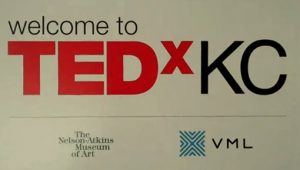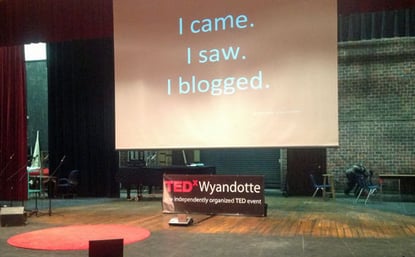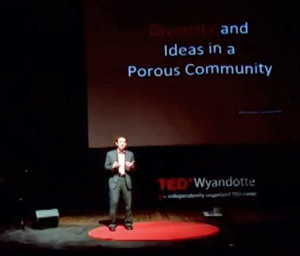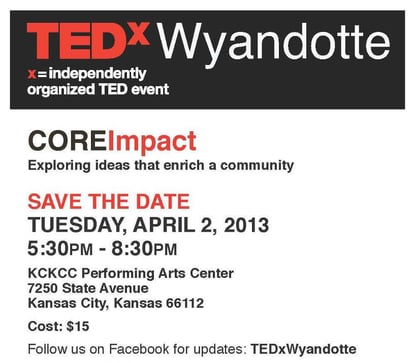 One learning from the 2011 TED simulcast is that the 18-minute TED talk isn't a magic formula format ensuring anyone comes across as a genius presenter. While there were a number of outstanding creative presentations, many had clear weaknesses. The recaps today definitely fall into that category, but still held learnings which warrant being singled out.
One learning from the 2011 TED simulcast is that the 18-minute TED talk isn't a magic formula format ensuring anyone comes across as a genius presenter. While there were a number of outstanding creative presentations, many had clear weaknesses. The recaps today definitely fall into that category, but still held learnings which warrant being singled out.
The Entertainers
"Worlds Imagined" (or Session 5, or Wednesday's second 2011 TED simulcast session - all the same) was a mishmash and a relative disappointment on the heels of "Deep Mystery." It began with the E in TED: Entertainment.
Director Julie Taymor's introduction referred to the challenges she was going through and expressed amazement she was able to make her TED appearance. With the introduction's tone, I figured she must be battling a life-threatening illness. She started out talking about how under fire she was, but the huge challenge potentially standing in the way of her appearance was getting the Spiderman musical to work. With the presentations that followed on fighting poverty and disarray in Nigeria, trying to eradicate polio, and a taped talk from TEDxCairo, getting a Broadway show in check seems like nothing a little "what really matters" perspective wouldn't improve.
Taymor talked about her artistic perspective in bringing stories to the stage and screen. She begins with an ideograph - 3 broad strokes which convey an entire concept. These abstractions set the basis for how her stories unfold. While an artist has to be true to the artistic vision all the way through a piece, it's vital to also share it with the audience so they can actively participate in the work. Taymor pointed out realities such as budgets and the medium employed can dramatically affect how a story is depicted. Her fantastic reminder was you can use skeletal elements in the theatre to convey much more detail than is really there since inside the theatre, audiences are ready to suspend disbelief and fill in the blanks of what hasn't been depicted.
Morgan Spurlock (of eating McDonald's food for 30 days and filming it fame) was there to pimp his new movie "Greatest Movie Ever Sold." The film revolves around him trying to get advertising agencies to recommend their clients fund his movie through sponsoring product placements. He ultimately went directly to clients and got a number of brands to sign up. All the while he filmed his potential funders, editing it so they look foolish. His presentation hit close to my marketing home, yet it was so jarring because it was a purely promotional message among a 2011 TED simulcast of ideas. He did pass along some sage advice: you must embrace fear, transparency, and risk, and you will find opportunity in risk. Thanks for sharing.
The CEOs
Also during "Worlds Imagined," Indra Nooyi, Chairperson and CEO of PepsiCo, cited a statistic: only 5% of TED presenters in the past 10 years have been CEOs. After her presentation and that of Bill Ford, Executive Chair of Ford Motor Company, I'd recommend the number move lower. While other presenters were talking about what they are doing personally, CEOs talk about their organizations. Their stories, even when they are trying to be intensely personal (as Bill Ford was), sounded crafted by speechwriters. As with Spurlock's remarks, big full-on commerce just felt icky during the TED simulcast (and this from a guy who loves commerce!).
The Second Big Picture Guy
Quick disclaimer: by the last 2011 TED simulcast session of the day, "Radical Collaboration," my brain was too zooming to take in many more ideas. Trying to process another 90+ minutes of content wasn't helped by the session's structure, which was all over the place. From Egypt to underwater luminescence, from crappy food to TED fellows, my attention span was way over-taxed. My sense was there was a significant, TED-insider back story which might explain the pieces, but the story wasn't apparent to TED newbies. My big take away as seemingly disconnected cause-related issues were presented - and support for each requested - was that TED had devolved into an intellectual Jerry Lewis Telethon with viewers left to decide the most worthy need to support: Nigerian kids, polio, health food, or finding other life in space.
Amid these competing inputs, French street artist JR, the 2011 TED Prize winner, delivered an image-rich, although challenging-to-understand, talk on his use of enormous photo posters displayed in metro settings to call attention to issues and people society overlooks. Funding his project through art sales, JR travels around the world to create his street installations (made of paper and glue) which sometimes are in place for years. The gist of the award, as best I could tell, was to provide not just finding to JR, but to also help fulfill his wish of using art - photographs and posters - to change the world through involving people globally in creating giant images.
As JR's presentation concluded, host Chris Anderson hopped on stage to play a role similar to a private school fund raising auctioneer, soliciting ideas from the audience on how they could help fulfill JR's wish. While there were some intriguing suggestions (a guy from Google offering to make sure the images show up on Google Earth and Darren Rowse - at least I think it was him - offering access to his 150,000 amateur photographer audience), many suggestions went counter to JR's artistic vision. His wish was for others to become more involved, but attendees were more focused on giving HIM new places to work (including inside museums, which did not trigger a positive reaction from JR).
I'm sure this format for generating ideas is a well-developed and understood formula for TED insiders, but it got my brain zooming thinking of MUCH more effective ways this mass solicitation of support could be conducted. Again, I'll admit by this point I was probably just cranky and needed a nap, because I didn't take away the emotional impact from JR's presentation that others present at the simulcast did. Check out JR's video (one of the first 2011 TED videos to be posted) and his project website to truly appreciate how you can get involved.
I warned you there was a lot of content, even with skipping several discussions. Tomorrow we'll cover the take-away lessons from the 2011 TED simulcast, sponsored in Kansas City by digital marketing agency VML and The Nelson-Atkins Museum of Art. – Mike Brown
When it comes to conferences, high impact presentations, and live event social media content, The Brainzooming Group is expert at shaping the right strategy and implementation to create unique attendee experiences before, during, and after an event. Email us at brainzooming@gmail.com or call 816-509-5320 to learn how we can do the same for your event!



